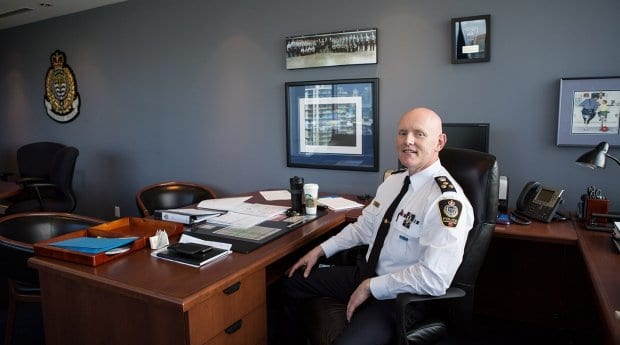Sitting in his office with a view of False Creek’s glass high-rises, Adam Palmer, the new chief constable of the Vancouver Police Department (VPD), rubs his bald head and hopes for sun at the Pride parade on Sunday, Aug 2.
“I’ll be in there,” he says. “I’ll need some sunscreen.”
“It’s one of the best events of the year, just a lot of fun,” he says.
Participating in Pride is part of building community ties, says the 28-year veteran of the force.
Palmer succeeded Jim Chu in the position of the city’s top cop on May 6.
Chu will be a hard act to follow.
In a departure from his predecessor Chief Jamie Graham (who in 2003 told Xtra he was reluctant to commit limited VPD resources to gay-sensitivity training), Chu participated in several queer community forums on violence and worked to strengthen police responses to LGBT issues.
For those who would commit anti-gay hate crimes, Chu had a message in October 2008: “They will answer to the Vancouver Police Department.”
“We care very deeply about your safety,” he told the Join Hands For Justice rally following Jordan Smith’s 2008 gaybashing on Davie Street.
“It’s personally distressing. Everyone is entitled to live free,” Chu said.
“You have my assurance that the Vancouver police will continue to take your safety seriously, and we will do all we can to preserve it and protect it,” he promised.
“Chu did a great job,” Palmer says.
It’s a relationship he says he wants to continue to build.
“I want the community to trust the VPD,” he says. “I want them to know that we’re there for them and that you can trust us, and that’s not just built up overnight just by the chief saying it. It’s built up by our actions.”
Palmer believes the relationship between Vancouver’s LGBT community and its police department has strengthened in the past few years. But, he says, there’s always room for improvement.
It’s about relationship building and connections, he says.
“Vancouver is a very diverse city,” he says. “We make sure we have a diverse police department.”
“Every officer that is coming through the police academy does get sensitivity training in LGBTQ issues,” he notes.
He says that training is extended in-house to community safety offices, jail guards and traffic officers.
Moreover, he says, he has reached out to Dara Parker at Qmunity, BC’s queer resource centre, to plan more training for 2016.
Parker says she met with Palmer July 22. “He was super receptive,” she says.
“I think the leadership is on board with making spaces for interaction with our community and the police,” she says.
She says Qmunity has offered to work with the VPD to provide sensitivity training programs around issues such as the community’s history with police, so officers can better understand why some people may distrust them, as well as trans sensitivity training.
She says the issue now is having police resources to be able to do the work. “I hope they will invest in training for the front-line officers,” Parker says.
While the police force has taken heat for not responding appropriately to gaybashings in the past, Palmer believes the VPD has done a better job in recent years.
He says last year, of 48 crimes believed to be motivated by hate, nine involved sexual orientation. “We investigated all nine and we laid charges in all nine,” he says.
The force has a full-time officer dedicated to dealing with hate-motivated crimes, he says. That officer is called in to assist investigators whenever a hate-motivated crime occurs. “I think we’re doing a very good job,” Palmer says. “We take it very seriously.”
“If anything comes to our attention, I give you my word that we will be on it right away and we will assign the appropriate investigators,” he says.
Earlier this year, the VPD faced criticism over its handling of the detention of a trans woman. The BC Human Rights Tribunal ruled in March that the VPD must find better ways to deal with transgender people, after officers called a trans woman by male pronouns and failed to provide her with proper care in jail.
The tribunal ordered the Vancouver Police Board to pay Angela Dawson $15,000 in damages.
Tribunal member Catherine McCreary found the VPD committed “systemic discrimination” in how it referred to trans people, and said new policies must be in place within a year.
Palmer wants to ensure that situation does not happen again.
He says a report on the incident was prepared in April. It had four recommendations, he says.
Those include using the tribunal report to engage with the transgender community to improve awareness; updating trans awareness training; developing a policy on trans identification for officer interactions and on police forms; and amending the jail operations manual to ensure medical issues are dealt with appropriately.
“We want to talk to Qmunity and other groups to ensure we provide the most recent and relevant training in those areas,” he adds.
Palmer says he was a patrol officer when he took trans awareness training with then-officer Roz Shakespeare, who transitioned while with the VPD.
“It was brilliant back in the day,” Palmer says.
He says he wants the public to be aware of VPD policies, documents he says can be found on the force website.
Overall, Palmer thinks the interaction the VPD has with the LGBT community is working.
“I think the interaction is great,” he says. “I think that we can always do things to improve it, but I think that we’re on a really good path. I think we have really good connections with the community.”
“Jim Chu, my predecessor, I think did an amazing job of connecting with the community,” Palmer says. “I want to continue in that vein.”

 Why you can trust Xtra
Why you can trust Xtra


